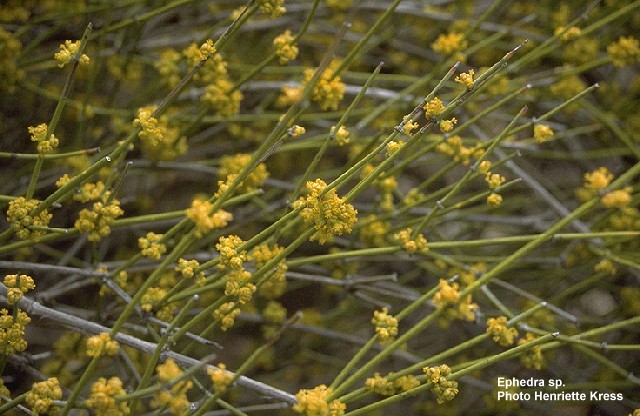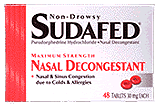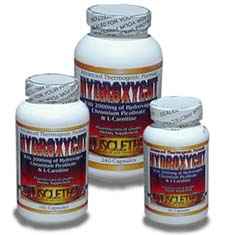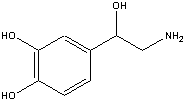Ephedra Alkaloids

Ephedra Alkaloids

Where does it come from?
The chinese species Ephedra sinica
was the original source of the alkaloid ephedrine, a common decongestant
in popular allergy and hay fever remedies. Since ephedrine has a chemical
structure similar to epinephrine (adrenalin), it works like a powerful
cardiac stimulant that may cause cardiac arrest in infants and heart patients.
New synthetic drugs based on the ephedrine/epinephrine ring structure are
now marketed as effective and safer bronchodilators. Pseudoephedrine, an
isomer of ephedrine, also occurs in species of Ephedra, and may be produced
synthetically. Compared to ephedrine, it causes fewer heart symptoms such
as palpitation, but is equally effective as a bronchodilator. It is used
in over-the-counter drugs such as Sudafed©. Ephedra sinica and other
species are also marketed under the name of "ma-huang," a popular herbal
stimulant and decongestant.

Sudafed©: A common over-the-counter
nasal decongestant containing the alkaloid pseudoephedrine.
How do you take it?
Since it is an herbal supplement, it
is usually taken by mouth. Usually, it will come packaged with other herbal
supplements such as L-Caritine, Chromium Picolinate, and Guarana Extract
to name a few. Used together they act as an energy booster and a reducer
of carbohydrate cravings, thus to lose weight. Ephedra
reduces appetite and stimulates fat metabolism, making it very effective
as weight-loss supplement. The active compound in Ephedra (Ma Huang) is
ephedrine. Ephedrine increases the metabolic rate, so that your body burns
fats and sugar more efficiently. By mobilizing stored fat and carbohydrate
reserves, ephedrine reduces your appetite. An
example of such a product is Hydroxycut by Muscletech which markets their
product as a "pharmaceutical quality dietary supplement". As well they
indicate that ephedrine the maximum dosage for a healthy adult is no more
than 100mg in a 24 hour period for no more than 12 weeks.

What are the dangers of ephedra?
Ephedrine -- the chemical that gives
ephedra its kick -- stimulates the heart and nervous system and can raise
blood pressure, sometimes to dangerous levels. Over the last five years,
the Food and Drug Administration has learned of more than 1,000 serious
reactions, including 38 deaths, that may be linked to "natural" supplements
containing ephedra. Users
have experienced soaring blood pressure, irregular heartbeat,
insomnia, tremors, seizures, heart attack, and stroke.
A case in point from the FDA's files:
A previously healthy 23-year-old male college student who'd taken a strength-building
product containing ephedra for two years was found dead by his sister in
the apartment they shared. The medical examiner ruled that ephedrine from
the supplement had destroyed large portions of his heart.
In a recent legal case, a 30-year-old
woman experienced insomnia and symptoms of mania shortly after she began
taking diet supplements containing ephedrine and caffeine. Within a week,
she was admitted to a medical center's psychiatric ward for and spent 10
days there. Before taking the supplements, she had no history of
a psychiatric condition.
Testing on the Body in Sports
Problems with Ephedrine Alkaloids arise when the chemical structures are compared. Like several other potent alkaloids, such as the alkaloid mescaline found in the peyote cactus, ephedrine contains a nitrogen atom that is not contained in a carbon ring. Mescaline has a chemical structure similar to the brain neurotransmitter dopamine. It is also structurally similar to the neurohormone norepinephrine (noradrenalin) and to the stimulant amphetamine. In the peyote cactus, mescaline is formed in a complex pathway from the amino acid tyrosine. A similar pathway in humans produces epinephrine (adrenalin) and its demethylated precursor norepinephrine from tyrosine. Dopamine and its precursor L-dopa are also derived from a tyrosine pathway.

Ephedrine |

Amphetamine |

Pseudoephedrine |

Norepinephrine |
Since there is such a likeness between
the banned drugs amphetamine and norepinephrine with that of ephedrine,
it is easy to see the concern that both athletes and drug regulating committees
have. As well, with the ephedrine acting like a "natural amphetamine" should
it be banned as well? The herbal supplement causes the same reactions in
the body as the illegal drug amphetamine.
Is it appropriate to exclude athletes from competition?
Several athletes have been disqualified
after testing positive for ephedrine which is a banned substance in sports
competition. This came as a surprise to the athletes who were not aware
that the supplements they were taking contained ephedrine. In 1988, Jimmy
Martin, a leading American judo champion, used Sunrider's Vitalite Action
Caps before the U.S. Olympic trials because he said they gave him terrific
energy. He was disqualified after testing positive for ephedrine.
British sprinter Solomon Wariso faced
being banned from the Olympics after testing positive for ephedrine. He
took Chinese herbal pills containing Ma Huang which he believed to be a
"health food." Canadian weight-lifter Jim Dan Corbett was stripped of three
bronze medals won at the 1994 Commonwealth Games after testing positive
for banned stimulants. Testing done by the Canadian Center for Drug-Free
Sports backed up Corbett's claim that his positive test was due to a vitamin
supplement Nature's Nutrition Formula One that contained three banned stimulants
none of which were listed on the label. Corbett was reinstated as an athlete
but did not get his medals back because the drugs may have helped his performance.
Dr. Andrew Pipe, center chairman said that Corbett's case put the spotlight
on the larger problem of the improper labeling of vitamin supplements.
Canada's Center for Sports warned Canadian athletes in the 1996 Olympic
Games at Atlanta not to use dietary supplements because their labels could
not be trusted.
Government regulation
Keep in mind
that the federal government doesn't regulate ephedra or other herbs and
supplements as it does prescription and over-the-counter drugs. The Food
and Drug Administration doesn't require that manufacturers test herbs or
supplements for safety or effectiveness, as it does drugs. For this reason,
the quality and potency vary greatly from product to product, with some
supplements containing too little (or too much) of the active ingredient.
Some supplements may be contaminated with traces of toxic materials and
other drugs. In addition, some herbs may interact in risky ways with drugs
or supplements, so it's important to talk with your doctor or pharmacist
before taking them.
Links:
www.ephedra.demon.nl
www.ephedrafacts.com
www.ibiblio.org/herbs/tdh-pres.html